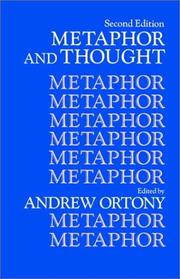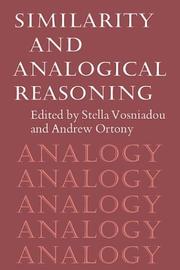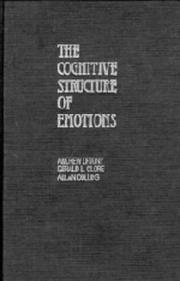| Listing 1 - 10 of 15 | << page >> |
Sort by
|

ISBN: 0521405610 0521405475 1139927213 1139173863 9780521405614 9781139173865 9780521405478 Year: 1993 Publisher: Cambridge Cambridge University Press
Abstract | Keywords | Export | Availability | Bookmark
 Loading...
Loading...Choose an application
- Reference Manager
- EndNote
- RefWorks (Direct export to RefWorks)
Metaphor and Thought, first published in 1979, reflects the surge of interest in and research into the nature and function of metaphor in language and thought. In this revised and expanded second edition, the editor has invited the contributors to update their original essays to reflect any changes in their thinking. Reorganised to accommodate the shifts in central theoretical issues, the volume also includes six new chapters that present important and influential fresh ideas about metaphor that have appeared in such fields as the philosophy of language and the philosophy of science, linguistics, cognitive and clinical psychology, education and artificial intelligence.
Metaphor --- Thought and thinking --- Métaphore --- --Langage /et Pensée --- Psycholinguistique --- --16 --- Denkprocessen --- Denkprocessen. --- #KVHA:Taalkunde --- #KVHA:Metaforen --- #KVHA:Stilistiek --- Mind --- Thinking --- Thoughts --- Educational psychology --- Philosophy --- Psychology --- Intellect --- Logic --- Perception --- Psycholinguistics --- Self --- Parabole --- Figures of speech --- Reification --- Cognitive psychology --- Theory of knowledge --- Metaphor. --- Thought and thinking. --- Metaforen. --- Pensée --- Métaphore --- --Psycholinguistique --- --Langage --- --Pensée --- --Metaphor --- --Denkprocessen. --- Health Sciences --- Psychiatry & Psychology --- Langage --- Pensée
Book
ISBN: 0521227275 0521296269 9780521227278 9780521296267 Year: 1979 Publisher: Cambridge: Cambridge university press,
Abstract | Keywords | Export | Availability | Bookmark
 Loading...
Loading...Choose an application
- Reference Manager
- EndNote
- RefWorks (Direct export to RefWorks)
Thought and thinking --- Metaphor --- Pensée --- Métaphore --- 801.56 --- Parabole --- 801.56 Syntaxis. Semantiek --- Syntaxis. Semantiek --- Mind --- Thinking --- Thoughts --- Educational psychology --- Philosophy --- Psychology --- Intellect --- Logic --- Perception --- Psycholinguistics --- Self --- Figures of speech --- Reification --- Cognitive psychology --- Theory of knowledge --- Metaphor. --- Thought and thinking. --- Cognition --- Métaphore
Book
Year: 1979 Publisher: Cambridge University Press
Abstract | Keywords | Export | Availability | Bookmark
 Loading...
Loading...Choose an application
- Reference Manager
- EndNote
- RefWorks (Direct export to RefWorks)
Book
Year: 1979
Abstract | Keywords | Export | Availability | Bookmark
 Loading...
Loading...Choose an application
- Reference Manager
- EndNote
- RefWorks (Direct export to RefWorks)

ISBN: 0521389356 0521362954 0511529864 0511875045 Year: 1989 Publisher: Cambridge : Cambridge University Press,
Abstract | Keywords | Export | Availability | Bookmark
 Loading...
Loading...Choose an application
- Reference Manager
- EndNote
- RefWorks (Direct export to RefWorks)
Similarity and analogy are fundamental in human cognition. They are crucial for recognition and classification, and have been associated with scientific discovery and creativity. Successful learning is generally less dependent on the memorization of isolated facts and abstract rules than it is on the ability to identify relevant bodies of knowledge already stored as the starting point for new learning. Similarity and analogy play an important role in this process - a role that in recent years has received much attention from cognitive scientists. Any adequate understanding of similarity and analogy requires the integration of theory and data from diverse domains. This interdisciplinary volume explores current developments in research and theory from psychological, computational, and educational perspectives, and considers their implications for learning and instruction. Well-known cognitive scientists examine the psychological processes involved in reasoning by similarity and analogy, the computational problems encountered in simulating analogical processing in problem solving, and the conditions promoting the application of analogical reasoning in everyday situations.
Cognitive psychology --- Comparison (Psychology) --- Similarity (Psychology) --- Analogy --- Reasoning (Psychology) --- Learning, Psychology of --- Comparaison (Psychologie) --- Similarité (Psychologie) --- Analogie --- Raisonnement (Psychologie) --- Psychologie de l'apprentissage --- Congresses. --- Congrès --- Cognition. --- Learning. --- -Comparison (Psychology) --- -Learning, Psychology of --- -Reasoning (Psychology) --- -Similarity (Psychology) --- -Paired-association learning --- Perception --- Thought and thinking --- Learning --- Psychology of learning --- Educational psychology --- Comprehension --- Learning ability --- Attention --- Consciousness --- Knowledge, Theory of --- Psychology --- Reasoning --- Memory Training --- Phenomenography --- Training, Memory --- Memory Consolidation --- Education --- Cognitive Function --- Cognitions --- Cognitive Functions --- Function, Cognitive --- Functions, Cognitive --- Congresses --- Psychological aspects --- Analogieën (psychologie) --- Analoog redeneren --- Denkprocessen --- -Congresses --- Analogieën (psychologie). --- Analoog redeneren. --- Denkprocessen. --- Similarité (Psychologie) --- Congrès --- Cognition --- Paired-association learning --- Life Sciences --- General and Others
Book
ISBN: 9780511529863 9780521362955 9780521389358 Year: 1989 Publisher: Cambridge Cambridge University Press
Abstract | Keywords | Export | Availability | Bookmark
 Loading...
Loading...Choose an application
- Reference Manager
- EndNote
- RefWorks (Direct export to RefWorks)

ISBN: 0521353645 0521386640 0511571291 9780521386647 9780511571299 9780521353649 Year: 1994 Publisher: Cambridge: Cambridge university press,
Abstract | Keywords | Export | Availability | Bookmark
 Loading...
Loading...Choose an application
- Reference Manager
- EndNote
- RefWorks (Direct export to RefWorks)
It has long been clear that the way in which people interpret the world affects our emotional reactions. What has been less clear is exactly how such different interpretations lead to different emotions. This is the central question addressed by The Cognitive Structure of Emotions. Taking a cognitive science perspective, a systematic account is presented of the cognitive structures that underlie a wide range of different emotions. Detailed proposals about the factors that affect intensity are also offered. The authors propose three broad classes of emotions, each corresponding to a different attentional focus. One class consists of reactions to events, one of reactions to the actions of agents, and one of reactions to objects. By basing their analysis of the antecedents of emotions on an analysis of the perceived situational conditions that elicit them, the authors offer the prospect of accounting for variations in the emotions of different individuals, different cultures, and perhaps even different species.
Cognitive psychology --- Affective and dynamic functions --- Emotions --- Cognition --- Psychological Theory --- Emotions and cognition --- Cognition and emotions --- Psychological Theory. --- Cognition. --- Emotions. --- Health Sciences --- Psychiatry & Psychology --- Experimentele psychologie --- motivatie en emotie. --- Emotions and cognition.
Book
ISBN: 9780511571299 9780521353649 9780521386647 0511571291 Year: 1988 Publisher: Cambridge : Cambridge University Press,
Abstract | Keywords | Export | Availability | Bookmark
 Loading...
Loading...Choose an application
- Reference Manager
- EndNote
- RefWorks (Direct export to RefWorks)
It has long been clear that the way in which people interpret the world affects our emotional reactions. What has been less clear is exactly how such different interpretations lead to different emotions. This is the central question addressed by The Cognitive Structure of Emotions. Taking a cognitive science perspective, a systematic account is presented of the cognitive structures that underlie a wide range of different emotions. Detailed proposals about the factors that affect intensity are also offered. The authors propose three broad classes of emotions, each corresponding to a different attentional focus. One class consists of reactions to events, one of reactions to the actions of agents, and one of reactions to objects. By basing their analysis of the antecedents of emotions on an analysis of the perceived situational conditions that elicit them, the authors offer the prospect of accounting for variations in the emotions of different individuals, different cultures, and perhaps even different species.
Emotions and cognition. --- Cognition and emotions --- Cognition
Book
ISBN: 9781108934053 9781108844246 9781108928755 1108928757 1108844243 1108934056 1108946046 Year: 2022 Publisher: Cambridge, United Kingdom: Cambridge University Press,
Abstract | Keywords | Export | Availability | Bookmark
 Loading...
Loading...Choose an application
- Reference Manager
- EndNote
- RefWorks (Direct export to RefWorks)
"Emotions have many facets. They involve feelings and experience, they involve physiology and behavior, and they involve cognitions and conceptualizations. There are important questions that can be asked about the expression of emotions (e.g., Fernández-Dols & Russell, 2017; Keltner et al., 2019), and the language of emotion constitutes an interesting research domain in its own right (e.g., Lindquist et al., 2015; Wierzbicka, 1999). But in this book, although we will surely have quite a bit to say about, especially, the relation between language and emotions, our main concern will be with the contribution that cognition makes to emotion. In particular, we will focus on the role of the system of cognitive representations--the value system--that leads people to appraise the situations in which they find themselves as good or bad, as beneficial or harmful, or, more generally, as positive or negative, that is, valenced. The value system, which we take to be comprised of three classes of cognitive representations--(the current state of) a person's goals, standards, and tastes--is central to the theory that we propose. Broadly speaking, goals (i.e., representations of desired states of the world) are"--
Emotions and cognition. --- Cognition and emotions --- Cognition
Book
Year: 1991 Publisher: Hillsdale Erlbaum
Abstract | Keywords | Export | Availability | Bookmark
| Listing 1 - 10 of 15 | << page >> |
Sort by
|

 Search
Search Feedback
Feedback About UniCat
About UniCat  Help
Help News
News